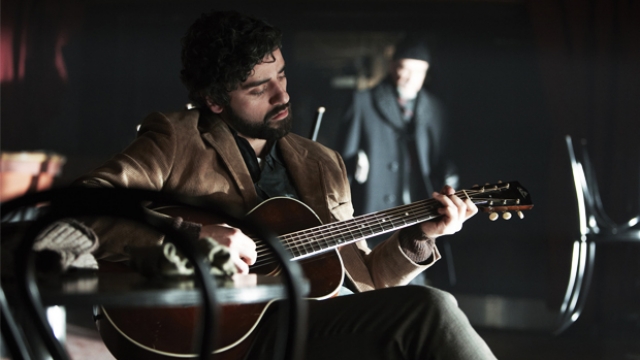By Mark Saldana
Rating: 3.5 (Out of 4 Stars)
When Bob Dylan first sang, “The times, they are a-changin.” he wasn’t just whistling Dixie. Big changes in pop culture, politics, mores, and music arrived in a huge way in the 1960s. Dylan, the main icon of 60s folk music changed as well when he went from performing folk music on an acoustic guitar in coffee shops to an electric guitar slinging star on large stages. Change, whether we adapt or not, affects us all. In the latest film by the idiosyncratic duo known collectively as The Coen Brothers, audiences will be taken back to the early 1960s, during the beginnings of the sixties revolution and will get a glimpse into the life of a (fictional) folk musician who has difficulty dealing with life changes which have brought his career to a near halt.
Llewyn Davis (Oscar Isaacs) has tasted moderate success when he was a part of a folk duo, but those days have faded. The year is 1961 and Davis barely scrapes a living in the folk scene of Greenwich Village, hustling live gigs and un-credited studio work wherever he can. He dreams of big success, but a success where he can maintain his artistic integrity uncompromised. However, Davis’s attempts at a Bohemian, carefree lifestyle come with several costs and his inability to let go of the past keeps him from blossoming as an artist.
Most movie audience members either love or dislike the films of Ethan and Joel Cohen. As writers and directors they have an uncompromising style of filmmaking and story telling and have an identifiable quirky sense of humor. Their love for larger than life and sometimes bizarre characters is evident, even in their more subdued films. In Llewyn Davis, the Coens do exercise some restraint as they wish to offer a somewhat realistic portrait of an artist and the scene in which he exists. Still, the brothers find a way to successfully blend a few peculiar characters and extraordinary scenarios and they pull it off beautifully.
The Coens are masters of unconventional storytelling which makes every one of their films a joy to first experience. One can expect something curious or outlandish from any one of their films, but one can never know exactly what that will be. That penchant for the unusual and unorthodox is what usually polarizes their audiences. As for me, I love unconventional methodology, especially when it comes to filmmaking and storytelling.
I think because the film is a bit smaller in scope and occasionally redundant in a few of its situations, the Coens left me wanting more in terms of a story with more closure. This may have not been the goal of their artist portrait, but I cannot help, but feel this about the overall experience. I remember leaving the film screening, thinking, “That was it?” At the same time, I do appreciate the fact that they didn’t deliver a formulaic story with a contrived happy ending.
The writing and direction by the Coens, along with the performances by the cast making this limited journey worthwhile, though. Oscar Isaac, an actor who has a considerable body of work as an actor, but has yet to become a widely recognized name, delivers an excellent performance as the title character. Isaac also shows that he is quite capable of becoming a folk musician as he performs all of his character’s songs in the film. The film also features the beautiful and lovable Carey Mulligan as Llewyn’s former love interest Jean. She is not only captivating to watch, but she also delivers a solid turn and performs some music in the film as well. Justin Timberlake, who has somewhat successfully made the transition from singing to acting, gets to combine his talents here. J.T. portrays a folk musician named Jim who may have achieved more success than Llewyn, but has compromised his art to get there.
The movie also features appearance by television veterans Ethan Phillips who portrays Mitch Gorfein and Max Casella who plays Pappi Corsicato. These recognizable actors seem to have fun acting in these highly amusing roles. The most memorable appearances in the movie have to be John Goodman and Garrett Hedlund, though. Goodman stars as Roland Turner, an acerbic and opinionated old man with a nasty habit, and Hedlund plays his driver Johnny Five. Llewyn encounters these two unusual characters while hitchhiking to a gig. Their screen time is limited, but unforgettable.
Also unforgettable is the superb soundtrack which features songs performed by the cast. The Coens once again enlist the talented T. Bone Burnett to executive produce the music of the movie and also recruit Marcus Mumford to serve as the music’s associate producer. The cinematography by Bruno Delbonnel is absolutely gorgeous and the crews assembled for costumes, set and art designs do exceptional work. Say what you will about the quirkiness of the Coens, but their ability to present a film with style and panache cannot be disputed.
Their attention to the aesthetics and their ability to present a story in creative ways are the reasons their fans flock to the theaters to see the Coens’ films. As for those who have not yet acquired a taste for their brand of movies, they may find something to enjoy in Llewyn Davis, but perhaps not enough to justify the expense of full priced movie tickets. I highly encourage the fans to run out and see this film, because I know that they will love this film very much. These same folks will also want to purchase the movie soundtrack because the songs and music are positively irresistible.
